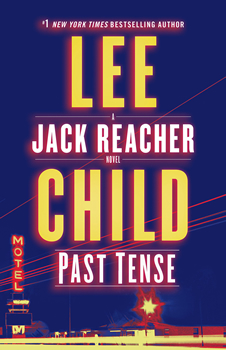

Between The Lines: Lee Child by Josie Brown
Digging Up The Past
 By Josie Brown
By Josie Brown
Iconic anti-hero Jack Reacher has made thriller writer Lee Child an internationally renowned author. In PAST TENSE—the latest novel in this New York Times bestselling series—a turn in the road takes Child’s avenging loner to his long-deceased father’s hometown, where the ghosts of his past aren’t necessarily dead and buried.
As is customary, Child started PAST TENSE without a plot.
“I am the extreme example of a pantser,” he says. “I have no idea at all what the book is going to be about. I just start it and hope that somehow it sets in motion a chain of thought that will then produce a decent story. This is number 23 in the series. Having done so many, I’ve learned to trust that process.”
And as is usually the case, the book’s first paragraph inspired the entire plot.
“Reacher’s rootlessness leaves him a lot of time to kill and no particular place to go,” Child says. “The first paragraph was supposed to launch a journey, or a trip, whatever. But when I re-read it, I realized that I used a lot of ornithological imagery: about Reacher leaving the Northeast at the ending of the summer and planning to head south, like a migration. I then thought, ‘Why have I done that? What is the subliminal content about that paragraph?’”
He remembered writing about ornithology in another book, where he describes Reacher’s father. “There’s a brief mention of this Marine Corps officer who was a stone-cold killer but also a birdwatcher. Tough, but also somewhat tender,” Child says, adding that a few meager details about the man also appear in a short story. “In it, I mention his name—Stan—and the town he’s from: Laconia, New Hampshire. I chose Laconia simply because it sounds like ‘laconic,’ which is a Reacher family characteristic.”
In PAST TENSE, Reacher finds himself close enough to Laconia to stop in and do a little research on his family history. Soon, though, an incident there mirrors something that involved his father decades earlier: an altercation with a bully. In his father’s case, it drove him from the town while he was still a teenager. Not Reacher. Despite being outnumbered, he stands tall against any and all aggressors.
Child insists Reacher inherited this trait from his mother, whose presence is more clearly drawn in the series. The reason for this: Child never wanted to fall back on the familiar trope in which the protagonist is, as he puts it, “some ‘tough, uncompromising guy just like his father.’”
As always, Child brings the reader into Reacher’s mind as he comes up with his offensive strategy. “Anecdotally, readers love to think along with Reacher,” Child says. “It’s something I know they’re going to enjoy.”
It’s a technique he’s borrowed from movies and television. “You do the slow parts fast, and the fast parts slow,” he says. A perfect example: a nature film. “Let’s picture an angry sea with waves breaking on a rocky shore. In real time, it’s over very quickly unless the explosion of the wave comes at us in slow motion. That way, we savor that transient moment.”
The same is true about violence, Child says. “As two people approach each other, the tension mounts and the emotional stakes are higher, as is the physical fear. But it’s over very, very quickly. By slowing down the narrative, you heighten the stakes and milk the moment. I take that down almost to slow motion.”
Sometimes he gives the reader two, or even three scenarios for the price of one. “It could go X, it could go Y, or it could go Z—all of which are exciting and add value to the reader’s experience. But then you get into the one that actually transpires.”
Reacher’s search for answers about his father’s past is just one plot in PAST TENSE. Another equally important subplot involves a young Canadian couple whose detour into a deserted motor inn has fatal consequences.
Yet again, the novel’s very first paragraph became the catalyst for this thread as well. Says Child: “In it, I mention Maine. This got me thinking: ‘Maybe I’ll do a Stephen King-type strand, where the reader gets something more horrific than I usually write. The characters can get trapped in some sinister motel and then we’ll see what happens.’ But they took over the story.”
The couple, Patty and Shorty, may be victims, but they are also survivors. “They are pretty resourceful,” Child says. “Even Shorty, who’s a bit thick. Patty is a bit patronizing about it, but he comes through in the end.”
Right—with a major assist from Reacher.
“The reader knows he’s eventually going to show up and help them out,” Child says. “But the tension is when will he show up.”
A successful career as a novelist was not something Child dreamed of. It was the result of a layoff from a television production company. “I had a job that was a lot of fun and satisfying. It gave me plenty of time off for my family, for reading, and for hobbies. But then I was fired. What was I going to do next? It was a simple equation: I loved reading. I’ve read tens of thousands of books. So, why not try writing one?”
In Child’s case, there was no room for doubt, let alone failure. “I was out of work and broke. Desperation is a huge factor. It makes you take it one hundred and twenty percent seriously. The goal is to make a living; to put food on the table. It was, ‘Get it done. Write the book. Get it sold. Then write the next one.’ If that’s foremost in your mind, you don’t get all cross about editors or this and that. You just do it to get paid. It makes you ruthless with yourself.”
Because unlike many novelists, writing books wasn’t Child’s lifetime aspiration, it could have become a barrier. “I missed what practically everyone else had—you know, that desire to be a writer. Many people claim they always knew they were going to be a writer. They have composition books of four-page novels from when they were seven years old. They seem to have an image in their minds as to what a writer is, and that is what they want to achieve. It’s the place they want to arrive at,” he says. “For me, it wasn’t like that at all. I came to it without any of the preciousness or inhibitions that others suffer from. I was happy being a reader. I just love reading! All the time I spend writing I would actually prefer to be reading someone else.”
Child sees the quandary in creating a business from an art form. “The writer is in the strange position of having to believe several different things simultaneously—and you must believe them all one hundred percent. Yes, it is a great job. It’s a craft. It’s a joy. It’s part of a long and honorable tradition that stretches back centuries. It’s all of those good things! But it’s also a job. And a business. And you have to take it one hundred percent seriously in that aspect too. A lot of people find a conflict there. They feel commercial pressure to alter what they’re writing. Still, you have to find a way of threading that needle for yourself. You’ve got to take both parts of the equation completely seriously.”
Simply put, Child feels that a writer’s success boils down to this: “Is what you want to write something that others want to read?”
He uses Charles Dickens as an example. “Dickens was a very popular writer in the middle of the nineteenth century. And then there was a backlash against him. Within a decade, he was regarded as a hack. A few years later, he was again regarded as a great writer. In 1900, G.K. Chesterton wrote a biography about him and tried to thrash this out. He made the argument that Dickens wasn’t just a hack. Or, as Chesterton put it, ‘Dickens did not write what the audience wanted. Dickens wanted what the audience wanted.’”
So what does Child attribute for his own success? “I’m a completely normal person in every possible way—except that I can also write. Whatever interests other completely normal people—of which there are billions—interests me too, and I write about it.”
Will there come a time when he feels Reacher’s story is played out?
Child says that actors in television face the same dilemma.
“It’s a tough issue to work out. The idea of an actor doing one role his entire life—from a teenager until he dies—seems weird. I feel that way about writing a series,” he says. “Fundamentally, it is absurd—to sit down and write twenty-plus books about the same guy. I am conscious of the absurdity of it, perhaps because I have a showbiz background. You want to get out in time. It’s the same in sports: you don’t want to be that one guy who sticks around a season too long and has a miserable last year. I would forgo the last couple of books if then people looked at the series with fonder memories rather than letting it fizzle out disappointingly.”
In other words, as long as readers enjoy Reacher, Child will keep writing his hero into memorable mayhem.
Photo credit (cover): Axel Dupeux
- Up Close: Jane Smiley - November 30, 2022
- Up Close: Lisa Barr - February 28, 2022
- Up Close: Kaira Rouda - December 31, 2021

